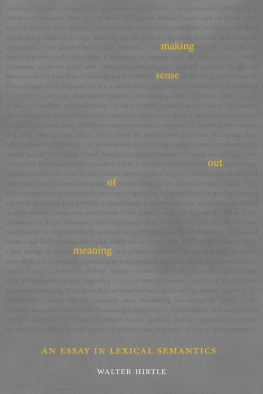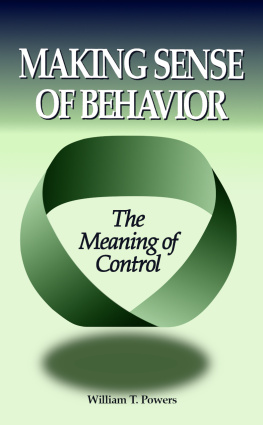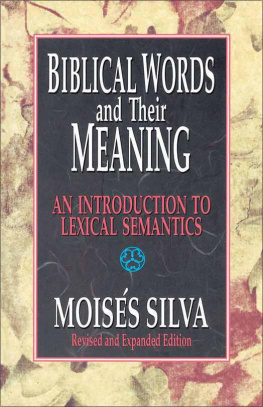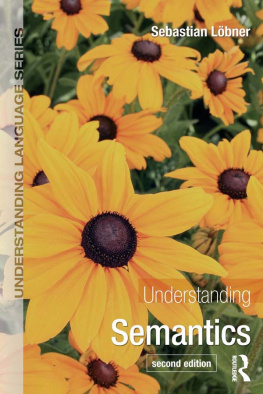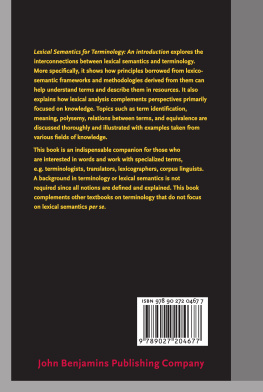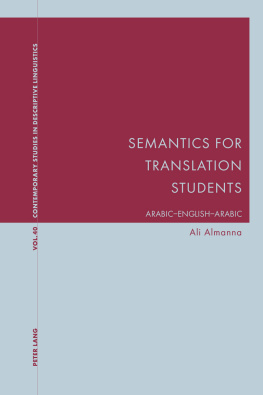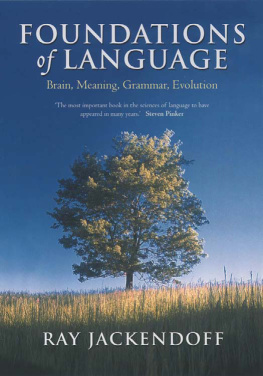Walter H. Hirtle - Making Sense out of Meaning: An Essay in Lexical Semantics
Here you can read online Walter H. Hirtle - Making Sense out of Meaning: An Essay in Lexical Semantics full text of the book (entire story) in english for free. Download pdf and epub, get meaning, cover and reviews about this ebook. City: Montreal, year: 2013, publisher: McGill-Queen’s University Press, genre: Home and family. Description of the work, (preface) as well as reviews are available. Best literature library LitArk.com created for fans of good reading and offers a wide selection of genres:
Romance novel
Science fiction
Adventure
Detective
Science
History
Home and family
Prose
Art
Politics
Computer
Non-fiction
Religion
Business
Children
Humor
Choose a favorite category and find really read worthwhile books. Enjoy immersion in the world of imagination, feel the emotions of the characters or learn something new for yourself, make an fascinating discovery.
- Book:Making Sense out of Meaning: An Essay in Lexical Semantics
- Author:
- Publisher:McGill-Queen’s University Press
- Genre:
- Year:2013
- City:Montreal
- Rating:3 / 5
- Favourites:Add to favourites
- Your mark:
- 60
- 1
- 2
- 3
- 4
- 5
Making Sense out of Meaning: An Essay in Lexical Semantics: summary, description and annotation
We offer to read an annotation, description, summary or preface (depends on what the author of the book "Making Sense out of Meaning: An Essay in Lexical Semantics" wrote himself). If you haven't found the necessary information about the book — write in the comments, we will try to find it.
Making Sense out of Meaning: An Essay in Lexical Semantics — read online for free the complete book (whole text) full work
Below is the text of the book, divided by pages. System saving the place of the last page read, allows you to conveniently read the book "Making Sense out of Meaning: An Essay in Lexical Semantics" online for free, without having to search again every time where you left off. Put a bookmark, and you can go to the page where you finished reading at any time.
Font size:
Interval:
Bookmark:
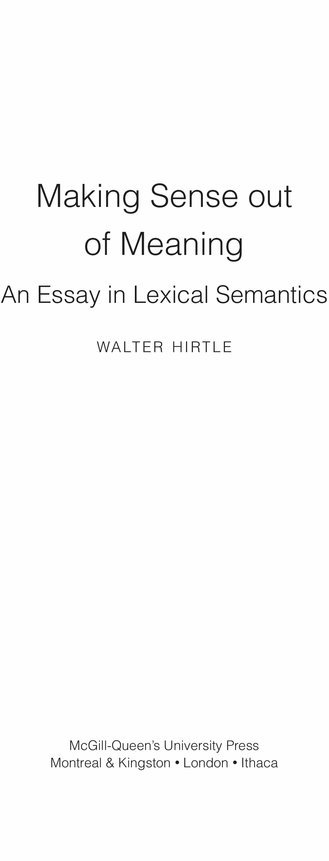
McGill-Queens University Press 2013
ISBN 978-0-7735-4205-1 (cloth)
ISBN 978-0-7735-8917-9 (ePDF)
ISBN 978-0-7735-8918-6 (ePUB)
Legal deposit fourth quarter 2013
Bibliothque nationale du Qubec
McGill-Queens University Press acknowledges the support of the Canada Council for the Arts for our publishing program. We also acknowledge the financial support of the Government of Canada through the Canada Book Fund for our publishing activities.
Library and Archives Canada Cataloguing in Publication
Hirtle, W. H. (Walter Heal), 1927, author
Making sense out of meaning: an essay in lexical semantics / Walter Hirtle.
Includes bibliographical references and index.
Issued in print and electronic formats.
ISBN 978-0-7735-4205-1 (bound). ISBN 978-0-7735-8917-9 (ePDF).
ISBN 978-0-7735-8918-6 (ePUB)
1. Polysemy. 2. Semantics. 3. Discourse analysis. 4. Cognitive
grammar. 5. Metaphor. 6. Psycholinguistics. I. Title.
P325.5. P65H57 2013 401'.43 C2013-904658-5
C2013-904659-3
This book was typeset by Interscript.
To the memory of Roch Valin
If I have risked venturing into an area of language that has not beenexplored in any detail from the viewpoint adopted here, that ofGustave Guillaumes theory of the word, it is because of Roch Valin.Some years before his illness, I was hesitant about applyingGuillaumes method to some problem in English we had neverenvisaged. Rochs reaction was something like Go ahead! Dive in!Coming from him, this gave me the confidence I needed to set towork on it, and on subsequent problems. His recent death remindedme of this turning point in my career and of how highly he wasesteemed by those who worked with him for his view of language.For him, language was mans most important creation, the word itscentral component, and meaning the heart of the word. Any valuethis essay may have is a tribute to his inspiration and of course toGuillaumes teaching, which inspired all he did in linguistics.
I owe much to discussions with my colleagues in the Fonds GustaveGuillaume at lUniversit Laval and am particularly grateful toClaude Guimier for comments on an earlier version of this study.Finally, the very fact that this essay has resulted in a publication isdue in large part to the encouragement and support of my wife.
This essay will be one more attempt to situate meaning, that protean component of words, within an overall view of language, to bringit within the scope of a linguistic theory permitting us to understandhow we manage to communicate by means of such a changeableelement. The traditional view of meaning as the mental counterpartof linguistic signs has been called into question by work in the fieldof neuroscience and even in the field of linguistics. If it is a mentalentity, then meaning is strictly subjective and so, in the eyes of manyscholars, cannot be treated scientifically. It remains that the traditional view of meaning is based on language as a phenomenon, onwhat we, as ordinary speakers, experience of language. Since it isour experience of any reality that provides the basis, the initial data,for reflecting on it in a scientific way, this view of meaning as a mental reality will be adopted here as the starting point to explore whatit can tell us of the nature of language itself.
As a number of linguists have pointed out, meaning occupies acentral place in language because it is what every speaker intendsto express and what every listener tries to understand. As a consequence, there is no shortage of books that deal with various aspectsof semantics and provide reference material for courses on the subject, and so one may well question the need for yet another study insemantics, particularly one limited to lexical meaning. Being amental reality, meaning is the most difficult part of language toanalyze, and no study can claim to have elucidated it completely.This includes the present study, which, however, will propose answers to two important difficulties encountered by a mentalistapproach.
First, having no existence outside the mind, meaning requiresa physical, perceivable sign to make it accessible to someone else.Those of a positivist bent have pointed out that meaning, beingpurely subjective, cannot be observed objectively and so, unlike itssign or any other physical object, does not lend itself to being measured by other observers. They therefore conclude that meaningdoes not give rise to data that can be treated scientifically, a conclusion that has led to linguists focusing on syntax or some other aspectof language and marginalizing meaning or even excluding it as anobject of scientific (rational) enquiry. This question will be re-examined here and an argument put forward to show that meaning cangive rise to observations calling for a rational explanation.
Second, even granted that meaning is the central reality of language, linguists are confronted with a difficulty when describing theobserved meaning of any word: the apparently insurmountable problem of polysemy. How can the same sign express different senses andyet be the same word in the eyes of the speaker? In his importantstudy of this problem, On Monosemy, Ruhl argues that a word has asingle meaning and attributes its apparent diversity of meaning tothe context, a view adopted here in part. However, while making useof his valuable data base, the present study will explore a dimensionof meaning Ruhl did not envisage certain widespread variationsfound with verbs, others with nouns and will examine the relationbetween a words basic lexical meaning and the different senses itcan bring to the sentence. This will lead to the proposal that it is awords underlying lexical monosemy which enables it to express thepolysemy observed in discourse.
Examining a word in this way, before it takes its place in a context,entails adopting a speaker-centred approach, as opposed to the listener-centred approach adopted by so many studies. Focusing onthe speaker involves examining how an idea is construed, alongwith the necessary grammatical components, to provide the meaning of a word ready for use. Taking into account the speakers rolein the act of language does call into question the validity of certainwidely accepted notions concerning conversion and a mental lexicon. On the other hand, through this speaker-oriented approach,we can discern the relationship between a words monosemy and itspolysemy and explain, without appealing to hypothetical rules or tosituation and context, how a speaker can use a word to express different senses and how a listener, making use of context and situation, can understand it rightly. Thus there is no opposition betweenthe two types of approach; to the contrary, the speaker-orientedapproach developed here provides a complement to listener-oriented approaches developed in other studies, a necessary complement if one wants to take into account the whole of the phenomenon,the act of language from beginning to end. References to otherapproaches have been brought in only incidentally, as an aid toclarify my approach, which must be understood before a full-fledgedcomparison with others can be undertaken.
This is an exploratory study, a first attempt to situate meaningwithin an overall view of the act of language, permitting us to understand how we manage to communicate by means of such a changeable element. Various scholars and poets have written on meaning,often with valuable insights suggesting its crucial role for mankind,and many linguists have approached meaning in an attempt toaccount for the vagaries of this mental IMPORT of the word (what itbrings into the sentence), some abandoning the attempt as futile.So far, however, no comprehensive view has emerged providing anunderstanding of meaning as an essential component of the general phenomenon of speaking, itself an essential of the human phenomenon. Any contribution the present essay may make to thisongoing attempt to understand the nature of language will be dueto an effort at the outset to approach the question of meaning fromthat more general point of view in order to discern its place in thelanguage act and its role in the formation and expression of humanthought.
Font size:
Interval:
Bookmark:
Similar books «Making Sense out of Meaning: An Essay in Lexical Semantics»
Look at similar books to Making Sense out of Meaning: An Essay in Lexical Semantics. We have selected literature similar in name and meaning in the hope of providing readers with more options to find new, interesting, not yet read works.
Discussion, reviews of the book Making Sense out of Meaning: An Essay in Lexical Semantics and just readers' own opinions. Leave your comments, write what you think about the work, its meaning or the main characters. Specify what exactly you liked and what you didn't like, and why you think so.

